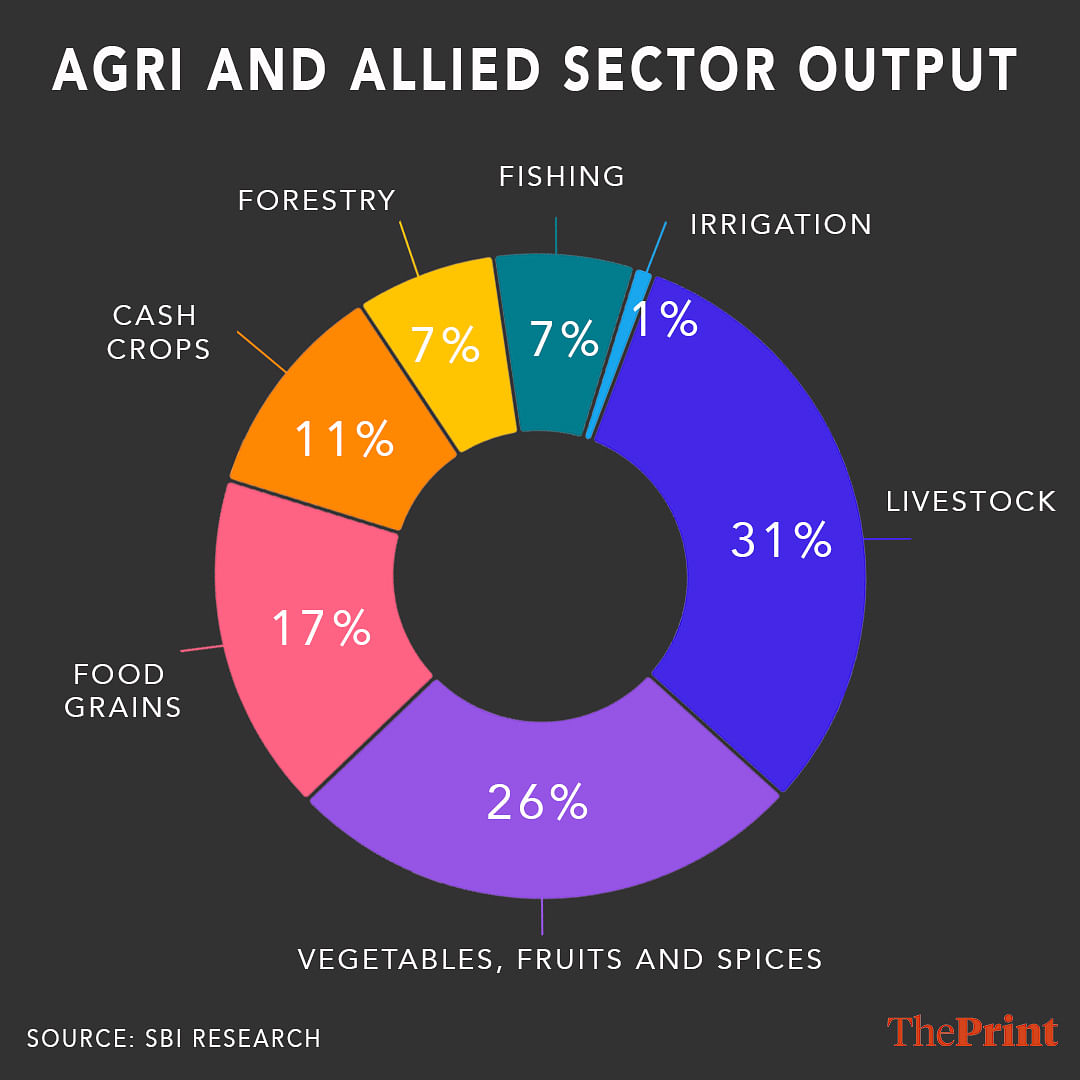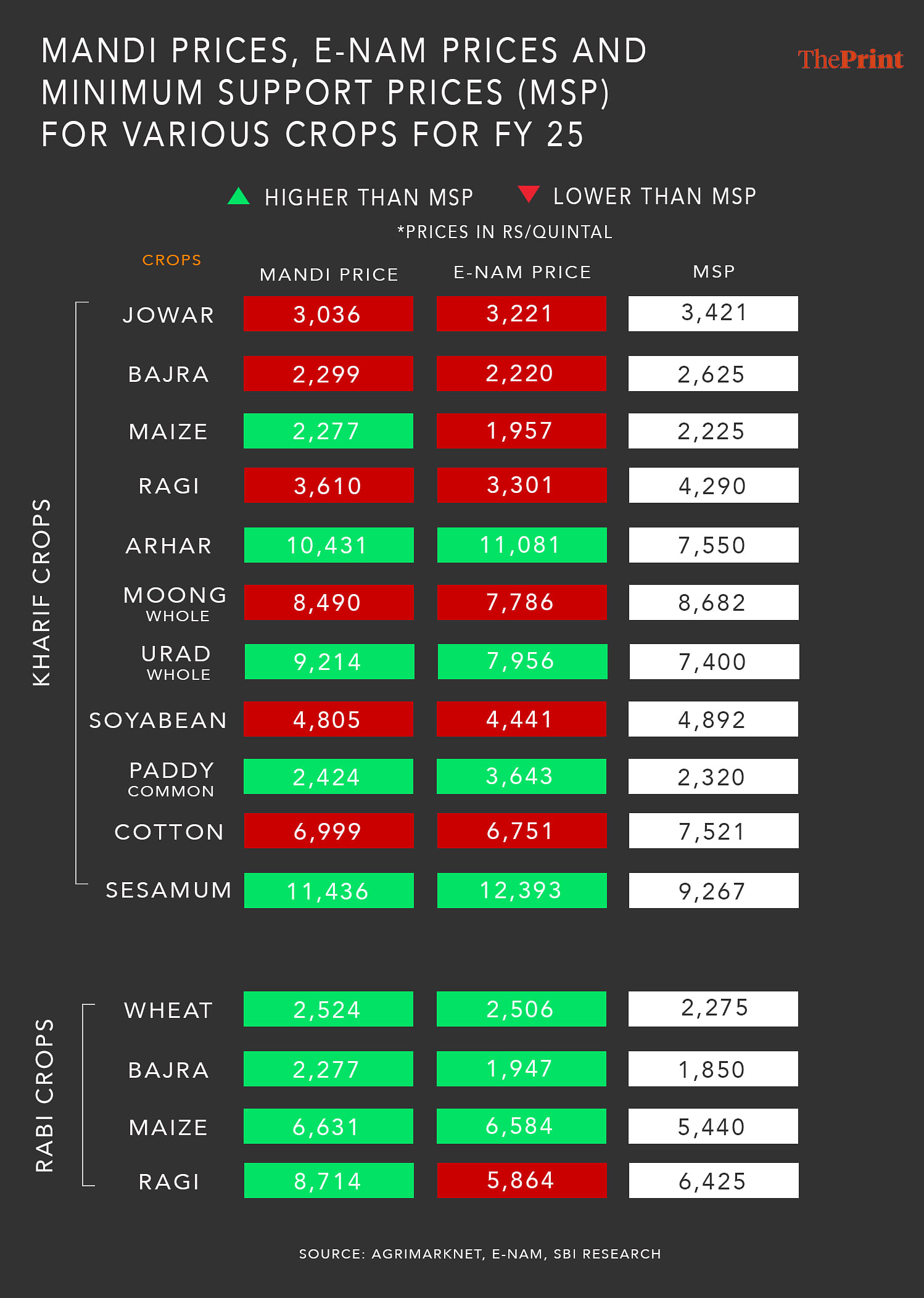New Delhi: Terming the minimum support price (MSP) as a “political weapon” that obfuscates the issues facing the agriculture sector, the State Bank of India’s (SBI) economic research team has recommended that the government should “vigorously” look for an alternative mechanism that encourages crop diversification and puts the obligation of buying crops at MSP on private parties.
In a report released earlier this week, SBI Research noted that while MSP has been instrumental in the price discovery mechanism, benefitting about 1.6 crore farmers, there are several innate issues with the MSP mechanism, including needless politics, disincentivising private investment, neglect of non-MSP crops, reduction in export competitiveness, and burden of trade disputes.
The report, released ahead of the upcoming Union Budget 2024-25, pointed out that MSP is provided for only 17 percent of agriculture output and there is a need to support the remaining 83 percent through continued agricultural sector reforms.
Making matters worse, the report added that, even within the 22 crops that the government declares MSP for, it procures only six to seven crops, such as wheat, rice and pulses, which account for just 6 percent of the total output of the agriculture and allied sector. Of the total output of Rs 56.1 lakh crore in FY 23, food grains output that the government procured under MSP was about Rs 3.4 lakh crore, or just 6 percent of the total agriculture and allied output.
In other words, it said, this policy leaves 94 percent of agriculture and allied output — which includes livestock (31 percent share), vegetables and fruits (26 percent) and fishing (7 percent) — outside the ambit of MSP support.

The report also found that the benefit of paddy and wheat procurement at MSP went to only four to six states, since these states account for about 99 percent of the wheat procurement carried out by the Centre, and more than 55 percent of rice procurement.
“Sadly, politics of MSP fails us to address the concerns of 71% [output from vegetables, fruits, fishing, forestry and livestock] in a more holistic manner as even after best efforts, the government is able to procure 6% of overall output at MSP,” it said.
The report has suggested that there is a need to have a direct consumer farmer interface through the development of more mandis across the states and that states must take a lead in this.
Also read: Marginal farmers consistently lost over 50% crops in past 5 yrs due to extreme climate conditions
‘Directly compensate farmers for difference between selling price & MSP’
On farmers’ demand for legal guarantee of MSP for all 22 crops, the report noted that the cost of procuring such crops in FY24 was around Rs 13.5 lakh crore. Additionally, such a legal guarantee would lead to the neglect of non-MSP crops such as fruits and vegetables, would disincentivise private investment, reduce export competitiveness and lead to storage issues, it said.
Recommending alternatives to legal guarantee of MSP, the research agency said that in the short-term, the alternative should put the obligation of buying crops at MSP or above MSP on private parties.
It also recommended that there should be a mechanism to directly compensate the farmers for the difference between selling price and the MSP. “This way, fiscal cost of the government will be reduced Long-term,” it said, adding that there is also a need to encourage crop diversification and promote high-value and climate-resilient crops to increase farmers’ income opportunities.
The report compared the e-National Agriculture Market (e-NAM) and mandi prices of products like maize, arhar, urad, paddy, sesamum, wheat, gram and masur, and found that the market prices are currently higher than MSP prices. This indicates “a clear evidence of price discovery in agricultural markets in recent times.” However, in some crops, like jowar, bajra, ragi, moong, soyabean and cotton, market price is lower than MSP.

eNam is an electronic trading platform for agricultural commodities set up by the government.
“Analyzing eNAM prices, we understand prices of major crops are already above MSP even though prices of not so widely cultivated crops are a little under MSP…hence GoI could devise a plan to provide price support to the farmers, if only market prices fall lower than MSP. Also, promising sectors with incremental value addition like livestock and horticulture should occupy a larger share of policy initiatives,” it recommended.
The report said that just four states — Punjab (51.3 percent), Madhya Pradesh (24.5 percent), Haryana (22.3 percent) and Uttar Pradesh (1.8 percent) — constitute more than 99 percent of the Centre’s wheat procurement.
In the case of rice procurement, Punjab, Telangana, Chhattisgarh, Odisha, Uttar Pradesh and Haryana together account for more than 55 percent of the Centre’s procurement.
Central procurement also accounts for large shares of these state’s production as well.
“Interestingly, the (central) government procures 92.8 percent and 73.6 percent of paddy produced by Punjab and Haryana,” the report said. “While in case of wheat it is procured mainly from Punjab (72 percent of its production) and Haryana (56.6 percent of its production).”
Also read: India’s MSP system for farmers has outlived its purpose. It’s time to phase it out






